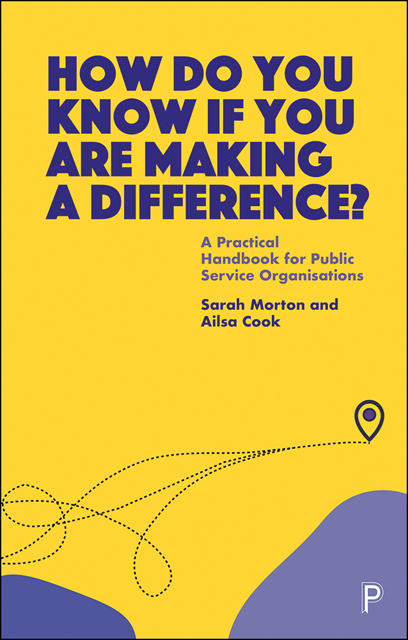 How Do You Know If You Are Making a Difference?
How Do You Know If You Are Making a Difference? Book contents
- Frontmatter
- Dedication
- Contents
- List of figures and tables
- Acknowledgements
- Preface
- 1 Why is it so hard to know if you are making a difference?
- 2 Why complexity thinking can help you understand public services
- 3 What data and evidence do you need to see what difference you are making?
- 4 Embrace the complex contex
- 5 Embrace the complex context
- 6 Clarify the change you want to see
- 7 Get going on your data, evidence and feedback improvement journey
- 8 Tracking progress towards outcomes and impacts
- 9 Telling the story of the difference your work makes
- 10 Using this approach in different contexts and sectors
- 11 Becoming an outcome- and impact-focused organisation
- References
- Index
10 - Using this approach in different contexts and sectors
Published online by Cambridge University Press: 20 June 2023
- Frontmatter
- Dedication
- Contents
- List of figures and tables
- Acknowledgements
- Preface
- 1 Why is it so hard to know if you are making a difference?
- 2 Why complexity thinking can help you understand public services
- 3 What data and evidence do you need to see what difference you are making?
- 4 Embrace the complex contex
- 5 Embrace the complex context
- 6 Clarify the change you want to see
- 7 Get going on your data, evidence and feedback improvement journey
- 8 Tracking progress towards outcomes and impacts
- 9 Telling the story of the difference your work makes
- 10 Using this approach in different contexts and sectors
- 11 Becoming an outcome- and impact-focused organisation
- References
- Index
Summary
Throughout this book we have set out an approach to outcome and impact evaluation that works for the complex problems and issues that public services face. We have used this approach when working with clients from settings such as health, social work and care, policy, international development, research, and children and adult services. What we have found is that there is more in common across these contrasting sectors and contexts than divides them in relation to outcome and impact evaluation. Whatever the setting, the key challenges remain: how to work well with complex contexts; how to understand and work well with outcomes and impacts; how to get the relevant data, evidence and feedback; and how to embed this in dayto-day work.
This approach is for people who really want and need to understand and evidence the changes they are making and want to learn and improve as w ell as be able to showcase their work.
In this chapter we will explore some of the issues that often arise when working in this meaningful way with outcome and impact evaluation. We will discuss:
• organisations and settings using this approach;
• embedding outcome and impact tracking as a change process;
• practical tips for your outcome- and impact- evaluation journey;
• case studies: embedding outcome and impact tracking in organisations.
We hope you will finish this chapter with a sense of what is needed to steer the change process in any particular setting so that you can reap the rewards and benefits of really understanding the difference any work makes.
Organisations and settings using this approach
When we were planning this chapter, we liked the idea of creating a neat diagram that encapsulated all of the types of organisations and settings that find this approach useful and helpful. Once we started mapping that out, it quickly became clear that it wouldn’t be possible, or at least, wouldn’t make things any clearer. So, what is set out below is an overview of the reasons, sectors, approaches and types of work where we know outcome mapping and tracking is a great way to understand, evidence and report on change.
Information
- Type
- Chapter
- Information
- How Do You Know If You Are Making a Difference?A Practical Handbook for Public Service Organisations, pp. 152 - 161Publisher: Bristol University PressPrint publication year: 2022